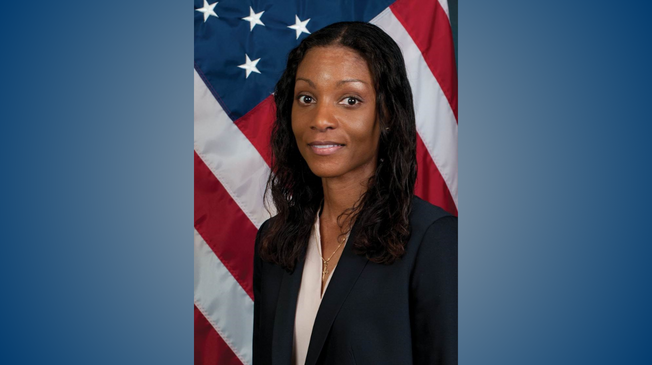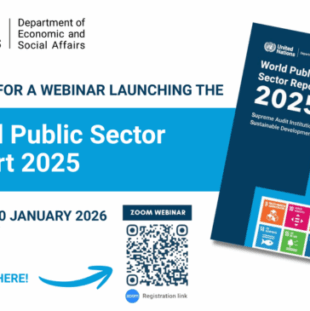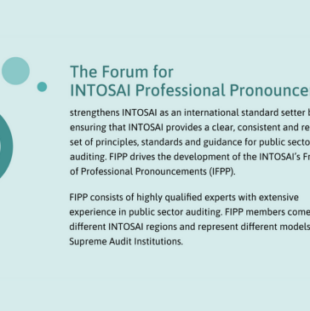INTOSAI Journal Welcomes New Secretary, Tonita Gillich

In December 2023, the INTOSAI Journal officially welcomed a new secretary to its Production and Design team. Ms. Tonita Gillich is an Assistant Director with the U.S. Government Accountability Office’s Forensic Audits and Investigative Services team. In addition to her role managing a performance audit portfolio, she will help to manage the Journal’s resources. We recently sat down with Toni to share more about her background, and for the INTOSAI community to learn more about her.
INTOSAI Journal (IJ): Hi Toni! We are delighted to have you join the team. Could you tell us a little bit about yourself and where you are from?
Toni Gillich (TG): Of course! I currently live in Maryland, USA. Growing up, I spent my childhood all around the world, as my father was an Army Officer. I lived in Asia, Europe, and the United States, and had the opportunity to travel to many different places globally.
Outside of work, I enjoy doing outdoor activities, like hiking. I live on the Chesapeake Bay, and I enjoy boating, fishing, and relaxing by the water. I also love to travel and see new places, even domestically here in the US.
IJ: What drew you to a career in public sector auditing?
TG: Before I started working at GAO, I was working at an international trade lobbying firm, which had a bit of a tie to working with the U.S. Congress. After I left that firm, I went back to graduate school, and was a part of a “Women in International Trade” organization. As part of that organization, I met two people who worked at the US GAO. An informational interview turned into a real interview, and I was offered a position on the financial markets team. I have been with GAO since 1999. I loved that a career in public sector auditing involved research, exploring the legislative process, and public service.
IJ: Tell us more about the work you have done in the past with GAO.
TG: Most of my work at GAO has been with the Financial Markets and Community Investment team, specifically looking at banking, securities, and payment systems issues. I had a focus on financial integrity and crimes during my graduate studies, and got to continue that here.
I appreciate that I have the unique opportunity at GAO to have audited issues that cross the public and private sectors. It is interesting to see how changes in technology have impacted financial markets, and how financial markets have responded to those changes. We have been able to assess the government role in how maligned actors seek to exploit those changes through technology, and the banking industry overall.
IJ: What are you currently working on?
TG: In 2016, I was promoted to the Forensic Audits and Investigative Service team, and I work in a unique area that bridges both my old and new teams. The Forensic Audits and Investigative Service team focuses on fraud, waste, and abuse in federal programs.
One of the longstanding issues in financial markets is undisclosed beneficial owners, which is an enabler of unlawful activity, including public corruption. Bad actors will place their assets in the US or other financial markets without disclosing the beneficial owner. It is important for government program managers to understand the risks posed by undisclosed ownership. Circumventing eligibility requirements or other laws can have important effects for programs and tax payers, ranging from the undermining of US sanction programs, to safety issues. My portfolio’s work has resulted in recommendations on these issues in the US Department of Defense contracting, and the US Federal Aviation Administration civilian aircraft registry.
I also work on trans-national fraud issues, and not only how fraud networks target individual consumers, but also how they target businesses and public programs. Both large and small scale fraud networks have adopted technology. As people and businesses use real time payments, fraud networks are targeting public programs, individuals, and businesses. Governments are talking about ways to respond, not only with interdiction and law enforcement, but with additional policy responses.
IJ:What are some of the challenges and rewarding aspects of audits in this area?
TG: It is hard to keep up with real time changes, as we are not able to audit as quickly as we would like. It is a challenge to break down the silos that keep governments from responding to recommendations and changes in a more nimble and flexible manner.
The most rewarding aspect of this work is speaking for and advocating for the tax payer and the integrity of public programs. People work so hard for their money, and in turn, pay their taxes. The least that can be provided to them is a fair and accurate accounting of what is happening with their money so that they can maximize their role in our republic and make informed decisions.
On a team level, I really enjoy developing staff and seeing them succeed when they have their achievements. It is one of my favorite things about working at GAO.
IJ: What are you looking forward to as INTOSAI Journal Secretary, and also in regards to engagement with the INTOSAI community?
TG: I love speaking with other auditors and other jurisdictions and being able to highlight their work. We learn so much from one another: our triumphs and victories, and also when we share our mistakes or have the benefit of hindsight. I look forward to being a part of a platform where we do those things.
IJ: What do you foresee as emerging issues in the near future for public sector auditing community globally?
TG: There is an increasing need of a public response for global illicit activity, scams and fraud, and a process for determining what appropriate responses should be. These will vary by society and country—some countries’ governments will have or want more or less involvement in regulating financial markets,.
Auditors will be able to take on emerging issues by continuing to hone their fundamental analytic skills. It is important for us to understand the fundamentals of auditing, and get back to the basic tenants of identifying cause, criteria, condition and effect. It is also important for auditing organizations to have diversity of thought, skills, and perspectives in an auditing organization, because it only makes it stronger.
IJ: Thank you for taking the time to speak with us today, Toni! We look forward to having your expertise and commitment to accountability, transparency, and knowledge sharing as part of the INTOSAI Journal team!





